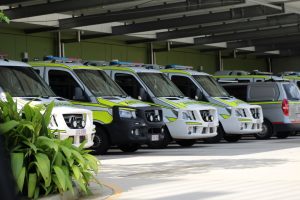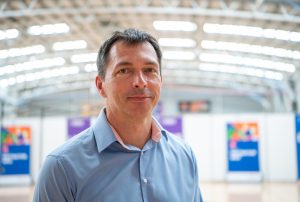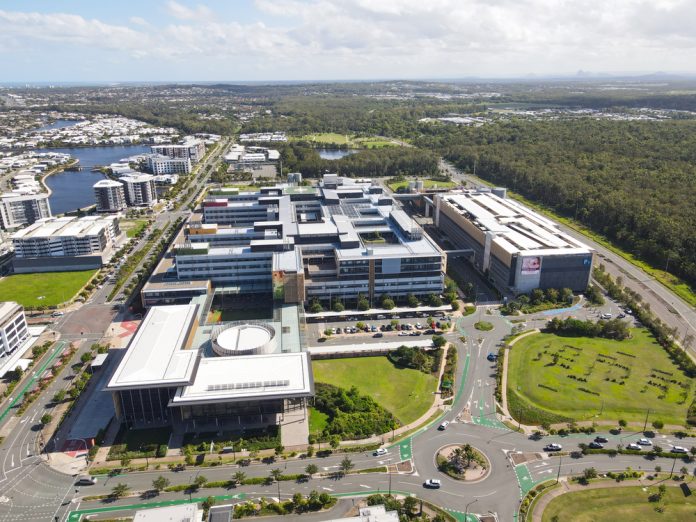Doctors have warned that Sunshine Coast University Hospital (SCUH), which is already under pressure, could become overwhelmed trying to treat COVID cases when Queensland reopens its borders.
They say the long lists of people languishing in pain for surgery, and “ramping” problems caused by bottlenecks in the Emergency Department, will only get worse once Delta is circulating in the community.
They are also concerned about the impact of not picking up diseases like cancer and diabetes early because patients could not be seen.
The latest quarterly hospital performance data reveals there were 3394 people on the waiting list for surgery at SCUH in April/May/June.
There was also a 30 per cent increase in patients attending the Emergency Department, rising to 21,316 people.
Queensland is facing pressure to reopen borders when the state reaches 80 per cent double dose vaccination in keeping with similar plans in NSW and Victoria.
But doctors, emergency specialists and surgeons want an action plan before the “inevitable” appearance of Delta in the Sunshine State and will gather on Thursday for an Australian Medical Association-led roundtable.

“There is a very real threat of our hospitals that are treating COVID cases becoming overwhelmed as we have seen happen already in New South Wales and Victoria,” said Ramping Roundtable chair and emergency physician, Dr Kim Hansen.
SCUH’s new CEO, Dr Peter Gillies, told Sunshine Coast News the hospital was better placed than most to handle a virus outbreak, with excellent facilities and staffing to be scaled up.
“The Sunshine Coast University Hospital is very well set up, it’s fantastic infrastructure, probably the best in Australia for negative pressure wards (isolation rooms) and ICU capacity,” said Dr Gillies.
“So we have the physical capacity and we’ve got the plans in place to ramp the staffing up if needed. I think we’re as well positioned — probably better positioned — than anywhere to deal with it, and it will depend on the vaccination level.”
However, Sunshine Coast Local Medical Association president, Dr Roger Faint, warned that SCUH’s resources would end up being directed away from surgery and outpatient treatment in order to cope with a surge in Delta patients.
Dr Faint said patients who needed surgery, such as hip replacements and shoulder operations, would be forced to wait for months, if not years, in pain.
“You’re looking at 18 months of pain and the health issues that go along with that such as mental health.
“Chronic disease will be missed — there’ll be less people picked up for diabetes and cancer because the hospital will be focussed on keeping enough beds for COVID.
“And that’s already been shown. In the southern states they’re picking up less breast cancer and less bowel cancer and that’s simply because people can’t get into the hospital to get investigated.”
Dr Faint said there would also be more “ramping”.
“Already without COVID we’ve got significant ambulance ramping, so that means when a patient goes to SCUH, not uncommonly paramedics will have to stand there for one to two to three hours, certainly at least an hour,” he said.
“Significant ramping takes time and energy away from them being in the community responding to people’s chest pains and trauma.
“Streamlining helps to a point but when you’ve got a rapidly increasing population it doesn’t matter how streamlined you make things, you’re still going to have people being ramped.”
Do you have an opinion to share? Submit a Letter to the Editor with your name and suburb at Sunshine Coast News via: news@sunshinecoastnews.com.au
Dr Faint said SCUH’s new chief executive officer, Dr Peter Gillies, would have significant challenges in his new role.
He said it cost about $1.3 billion a year to operate Sunshine Coast public health services “and it’s already been stretched”.
“So you can imagine the sort of extra money you need if there’s a COVID outbreak.”

Help keep independent and fair Sunshine Coast news coming by subscribing to our free daily news feed. All it requires is your name and email. See SUBSCRIBE at the top of this article
Dr Gillies said the hospital was “cautious but not alarmed” knowing that “at any point we can get an outbreak and at this point the vaccine rate is not high enough”.
“If you’re getting vaccination levels up above 80 per cent the modelling is showing it’s quite manageable,” he said.
“If we don’t get the vaccination up that high and we get an outbreak, you can correlate quite directly the lower the vaccination rate, the bigger the impact on the hospital system.”
University of the Sunshine Coast (USC) nursing lecturer and outbreak advisor Matt Mason said hospitals already struggled to cope with surges at times like the winter flu season, but COVID would be next level.
“One of the things we know at the moment is that … even though there’s not a lot of COVID, health services are stretched in terms of the services they can provide for normal operations because staff have been redeployed to other measures, for example vaccination clinics and testing centres,” said Mr Mason.
Those problems would be exacerbated by numerous staff, from nurses to surgeons and admin, being forced to self-isolate for weeks if they were exposed to COVID.
Mr Mason said it was inevitable that hospitals would cope with Delta outbreaks by cutting back services in other areas.
“That becomes a longer time to get your elective surgery; they ‘ll only do urgent, and category two and three will get pushed back.
“And that sounds good in theory but you’re living in constant pain because you need a hip replacement.
“That may not be an urgent thing for the health service, but not being to move and go to work and being in constant pain is not good for that individual and not great for society.”
Also, Mr Mason said it would cost the health system more in the long run for not picking up health conditions like cancer and diabetes early because patients could not be seen.
“Finding a cancer later is not good for that individual and potentially more costly for the health service down the line and is not great for the patient and their family.”
Action plan needed
The AMA’s Dr Kim Hansen, an emergency physician, warned a lack of real-time data from Queensland public hospitals was making it difficult to plan for potential outbreaks.
“We need our hospitals at 90 per cent capacity to allow the flow of those in emergency departments through the hospital system,” Dr Hansen said.
“It’s imperative we have an action plan developed this year, but we must be fully armed with data and collaboration.”
Access to available hospital beds staffed for emergency patients was more important than the number of beds overall, Dr Hansen said.
“We need real-time data from Queensland Health on the number of beds in each hospital ward across the state for emergency patients with teams to support the patients,” she said.
Queensland’s Chief Health Officer Dr Jeannette Young said real-time data was already used to direct ambulances to a particular hospital and pushed for an increased vaccination rate to prevent further pressure on the health system.
-with AAP





